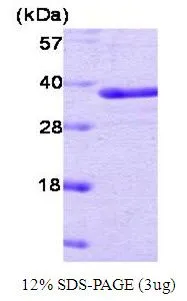
3 microg of GTX67148-pro Human PTP1B protein (active) by SDS-PAGE under reducing condition and visualized by coomassie blue stain
Human PTP1B protein (active)
GTX67148-PRO
Product group Molecular Biology
Overview
- SupplierGeneTex
- Product NameHuman PTP1B protein (active)
- Delivery Days Customer9
- Application Supplier NoteSpecific activity is > 10000 units/mg, and is defined as the amount of enzyme that hydrolyze 1.0 nmole of p-nitrophenyl phosphate (pNPP) per minute at pH 7.5 at 37C.
- ApplicationsFunctional Assay
- CertificationResearch Use Only
- Concentration1 mg/ml
- ConjugateUnconjugated
- Scientific DescriptionThe protein encoded by this gene is the founding member of the protein tyrosine phosphatase (PTP) family, which was isolated and identified based on its enzymatic activity and amino acid sequence. PTPs catalyze the hydrolysis of the phosphate monoesters specifically on tyrosine residues. Members of the PTP family share a highly conserved catalytic motif, which is essential for the catalytic activity. PTPs are known to be signaling molecules that regulate a variety of cellular processes including cell growth, differentiation, mitotic cycle, and oncogenic transformation. This PTP has been shown to act as a negative regulator of insulin signaling by dephosphorylating the phosphotryosine residues of insulin receptor kinase. This PTP was also reported to dephosphorylate epidermal growth factor receptor kinase, as well as JAK2 and TYK2 kinases, which implicated the role of this PTP in cell growth control, and cell response to interferon stimulation. Two transcript variants encoding different isoforms have been found for this gene. [provided by RefSeq, Jul 2013]
- Storage Instruction-20°C or -80°C,2°C to 8°C
- UNSPSC12352204
